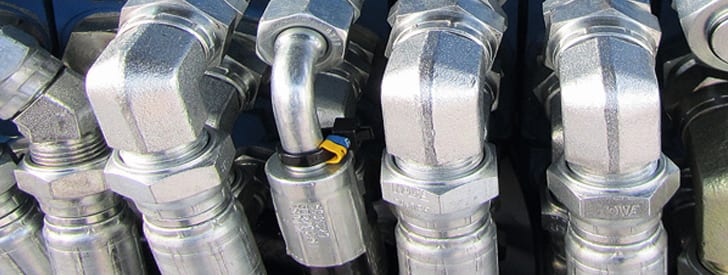CETOP has an eye for the future!
29 Oct 2018

BFPA CEO reports on the fact that CETOP is reviewing their current educational recommendations with a view to remaining relevant in an increasingly digitised world.
For many years, CETOP has been recognised as having established the ‘European Educational Standard’ for those wishing to pursue an international career in Fluid Power. Curiously, adoption of these CETOP recommended standards is very patchy and there are wide variations across the member states.
At the CETOP Education & Training Commission (E&T), meeting held on the 17th of May 2018 at the VDMA Offices in Frankfurt, a discussion took place regarding the extent to which CETOP Training (Levels 1, 2 & 3), has been adopted in each of the member countries. It was also recognised that most countries undertake some form of ‘none-CETOP’ accredited training delivered by both the local trade association and other training establishments around their country.
At present, the CETOP educational recommendations remains the only formal internationally recognised training criteria and yet its adoption has been both limited and highly variable between member states. Some would argue that it is under-valued and that adoption levels need to increase if only from a Health & Safety perspective.
In order to fully understand the current Fluid Power Education and Training landscape within Europe and to facilitate well-informed decision-making with regard to the future strategy of the CETOP E&T Commission, it was felt that an E&T survey of the membership should be undertaken.
The results were very interesting.
Against a background of chronic skills shortages in the engineering sector, it is not surprising that the results of this CETOP survey show that whilst growth has been slow, the CETOP Brand and its associated Educational recommendations are slowly gaining improved recognition across all European countries.
There are currently of the order of thirty CETOP accredited centres although this is not evident from the respondent’s data. (Only twenty-two were reported amongst those associations that completed the survey. The remaining eight must therefore reside within regions that were unable to complete the survey.) However, this growth is not uniform and there is some work to be done if the Educational Recommendations, for which CETOP is known, are to remain up to date and become more widely adopted.
The reasons for the low levels of adoption are varied but it is not evident that there is any general rejection of the standards as a credible and worthy criteria against which to undertake training. Rather, in some regions, the CETOP standard is considered to be too high for every day industrial applications whilst in others there are economic factors at play. Three and five day courses are expensive in both resource and financial terms and smaller less well funded SME’s are less able to make the required investment. In some regions, there are also legal challenges to be overcome in terms of auditing educational centres. Nevertheless, some countries, have made significant strides in establishing a good network of CETOP accredited training centres and have managed to realise good penetration into the government run educational establishments. Where there has been success, it is evident that the local trade association is particularly proactive in promoting the CETOP brand.
Given the niche nature of Fluid Power technology it is inevitable that there is a much larger number of non-CETOP accredited, private training companies and establishments undertaking bespoke training based upon either their customer’s requirements or their own product and service offering. This may be a target area for CETOP members if they are to encourage greater adoption of the CETOP educational recommendations. Germany, is slightly unusual in that the educational standards are dictated by the Department of Industry and Commerce thus they are particularly strong in non-CETOP training both within the private and government sector. (The content of this training, whilst not branded as CETOP will be very similar in content.)
When it comes to establishing how many Fluid Power students are being trained in any given year through either public or private means, the statistics are understandably difficult to establish. There appears to be a general consensus that the annual figure is, on average across all regions, of the order of 3000 students a year but this is not to be regarded as a reliable figure and there is no doubt that the figures in some regions are both lower and higher.
Whilst there is insufficient data to undertake a rigorous analysis there is also a suggestion that most Fluid Power training against the CETOP criteria is, (across Europe), undertaken at levels H1 and P1. The UK has made some progress in encouraging candidates to level H3 whilst Italy has had some success in attracting students into levels P1 and P2. Other countries may have had similar success but such data was not available.
There is a widely acknowledged migration towards inclusion of more electro-hydraulic and electro-pneumatic technology in the market but it is evident from the survey that adoption rates are slow. Given the exponential development of industrial digitization and the associated demand for ‘smart’ products there is no doubt that this evolution will gather pace. Inevitably, the major international companies will lead this market development and private training establishments will be amongst the first to expand this element of industry training.
Today’s Fluid Power engineers cannot afford to be afraid of electronic systems and Programmable Logic Controllers. Electro-hydraulics and Electro-pneumatics are now driving the industry.
Interestingly, only 45% of the survey respondents undertake their own training whilst those that do depend upon it for a valuable source of income. The reasons for this, (with the exception of Germany who are driven by the Chamber of Commerce), are not evident from the survey results. In the main, those that do undertake their own training tend to do so through third party experts and trainers.
Equally interesting, if not somewhat disappointing, the extent to which the CETOP educational recommendations are used as a bench mark for training is worryingly low with only 36% of members reporting that the CETOP criteria is the recognised standard with which trainers either comply or aspire to achieve. As discussed above, the reasons for this vary from region to region but there is no doubt that there is some work to be done in promoting these recommendations.
Paradoxically, awareness levels of the CETOP brand, whilst not as high as one would hope, are higher than expected with over half (55%) of respondents reporting that the brand was relatively well known in their country. This would suggest that the recommendations as they stand might be ‘out-of-kilter’ with current market requirements which adds weight to the argument for a review by the CETOP E&T Commission.
Encouragingly, 64% of respondents also report having a training strategy to further the best interests of the Fluid Power sector in their country. It would be of interest to compare those plans and see if there is sufficient synergy to take a consolidated approach to the whole subject and develop a European CETOP Training strategy that will both enhance the CETOP brand, raise educational standards across the industry and increase adoption levels for the CETOP Educational Recommendations.
In light of these findings, BFPA has taken an initiative to catalyse the development of a CETOP Education Commission Working Group with a mission to review the current H1 and P1 recommendations and update them in-line with current industry trends. We make no secret of the fact that as an Association, we believe that the inexorable migration towards integrated systems and generic motion control is the way forward and whilst ensuring that the core technology of Hydraulics and Pneumatics is not diluted, a third set of Educational recommendations should be adopted by CETOP to recognise this most obvious of industrial trends. A forthcoming meeting of the working group will take place in the Autumn of this year and we shall use this bulletin as a means of keeping members informed of the outcome from this initiative.

